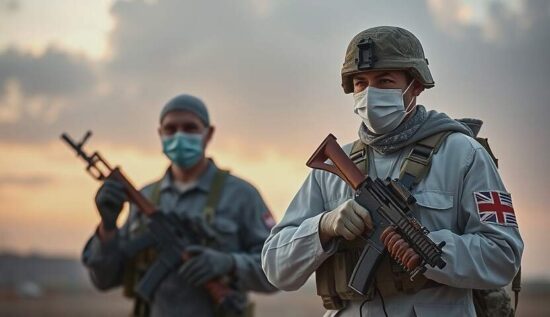In an interview with Telepolis, Bernhard Winter, a board member of the Association of Democratic Physicians, spoke out on the current developments. It is currently being attempted to militarize medicine – something that failed in the 1980s due to the resistance of the peace movement.
“The guiding question in medicine is: what benefits the patient the most in this moment” said Winter. “War medicine has a different focus. It serves to get wounded soldiers back into combat as quickly as possible and send them back to the front.”
Germany is designated as a hub in all the plans, which is why wounded soldiers might come to Germany as well. The Bundeswehr currently has access to 1,850 beds in its own hospitals, as well as an additional 2,000 in those of the professional associations. However, even if another 2,000 beds were requisitioned from the university hospitals, there would still be – considering the 1,000 wounded per day that NATO plans for its war in the East – an additional 4,000 beds that would need to be distributed to the normal hospitals.
At the beginning of the month, the commander of the Landeskommando Hamburg, Michael Giss, stated that the population needed to be prepared for the fact that in the hospitals, “the severely wounded soldier will be treated first, and the patient with a blind intestine later.”
“Health Minister Lauterbach had actually announced a new health security law in preparation for catastrophes and military conflicts, which would have contained regulations for the war scenario” reminded Winter. The end of the coalition government had prevented this for the time being.
“The border between the civil healthcare system and the military is being blurred, even outside of this federal law” criticized Winter. The Red Cross, for example, has already been subordinated to the Bundeswehr in the event of war, and the leaders of the Maltese and the Johannite orders are also seeking this kind of integration for financial reasons.
However, the core problem is a completely different one. “Why should the war on the so-called Eastern flank only be fought with tanks against tanks?” Winter asked. In the conflict of the 1980s, the danger of a nuclear war was a central argument.
“Back then, our slogan ‘We won’t be able to help you!’ was very effective in emphasizing to the population that a effective protection in the event of a nuclear war is impossible.”
In the attempts to make the healthcare system “war-capable” not only is the important distinction between civil and military institutions being blurred, but also the fact that the military is not even considering the possibility of a different kind of war, one that does not involve tanks and artillery.
“At the moment, the government and the military are managing to suppress this question” Winter concluded.





